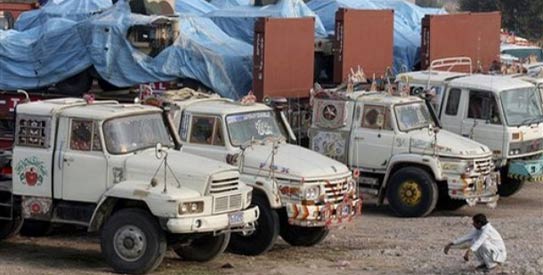
KABUL: Nato helicopters attacked a military checkpoint in northwest Pakistan on Saturday, killing up to 28 troops and prompting Pakistan to shut the vital supply route for Nato troops fighting in Afghanistan, Pakistani officials said.
Nato supply trucks and fuel tankers bound for Afghanistan were halted at Jamrud town in the Khyber tribal region near Peshawar hours after the raid, officials said.
Following are some facts about the Pakistani supply routes for Nato forces fighting in Afghanistan and the alternatives:
THE ROUTES AND SUPPLIES There are two routes into Afghanistan from Pakistan, one across the Khyber Pass to the Afghan border town of Torkham and on to Kabul. The other goes through Pakistan’s Balochistan province to the border town of Chaman and on to the southern Afghan city, and former Taliban stronghold, of Kandahar.
Between them these two routes account for just under one third of all cargo that the Nato-led International Security Assistance Force (ISAF) ships into Afghanistan.
Just over one third of all cargo goes on routes dubbed the “northern distribution network” through Central Asia, and the Caucasus or Russia. The remaining 31 per cent is flown in.
Nato declined to give details of how the shipments through Pakistan are divided between the two routes, but a spokesman said the figures likely change each month.
Some imported supplies for the fledgling Afghan armed forces, which the United States and its allies are building up, also come through the Pakistani routes.
WHAT HAS CHANGED As recently as July, the balance of supplies transiting through Pakistan and the northern distribution network were weighted in Pakistan’s favour, with slightly more than half of ground-transported supplies arriving through Khyber or Chaman.
After a string of disruptions, Nato-led forces and the US military decided to push supply networks away from reliance on Pakistan. The United States has gone even further than other nations in the alliance with a target that only 25 per cent of ground cargo should arrive via Afghanistan’s eastern neighbour.
This was done with the goal of “reducing reliance on any single line of communication to avoid any unnecessary vulnerabilities should that network become unavailable,” according to an ISAF spokeswoman.
Two cross-border attacks by Nato aircraft in autumn 2010, that killed three Pakistan soldiers, closed one supply route through Pakistan for several days. Nato apologised for the incident, which it said happened when its gunships mistook warning shots by the Pakistani forces for a militant attack.
In April a rally on a key highway by thousands of people against drone strikes again closed the supply route briefly.
The routes through Pakistan, particularly the northern one, are also vulnerable to insurgent attacks. In May a bomb on a Nato fuel truck killed at least 16 people in the Khyber area.
THE ALTERNATIVES The northern distribution network threads through either Russia or the Caucasus, across the Central Asian states of Kazakhstan and Uzbekistan and then into northern Afghanistan.
It is largely used to bring commercial-type cargo – described by ISAF as “sustainment items like food and spare parts” to troops serving in Afghanistan.
Afghanistan also has a border with Turkmenistan to the northwest, and Tajikistan to the north, and a sliver of remote mountainous territory connects with China in the far northeast – but that is too remote and high-altitude to make a major transit route.
What would be a convenient and cheap link through Iran’s port of Chabahar to western Afghanistan is ruled out by hostility between Tehran and Washington.










































